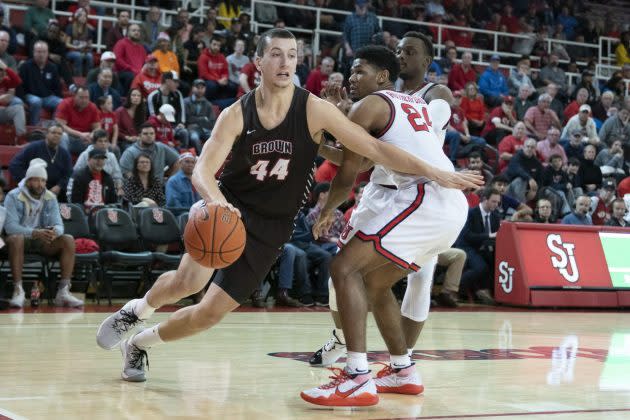‘Go to Duke,’ Ivy League Argues in Athletic Scholarship Lawsuit

In a new court filing, the Ivy League argues that an antitrust lawsuit brought by a former Brown University men’s basketball player and current member of the college’s women’s basketball team over the league’s denial of athletic scholarships doesn’t add up for a simple reason: The players could have attended similarly elite, but non-Ivy, colleges that offer athletic scholarships.
Attorneys representing Brown, Columbia, Cornell, Dartmouth, Harvard, Penn, Princeton and Yale filed a motion to dismiss on Monday in Connecticut’s federal district court. As explained in Sportico, the lawsuit (Choh et al. v. Brown University et al.) alleges Ivy colleges have unlawfully conspired to not pay athletes “any compensation” or reimburse them for education-related expenses in exchange for their athletic services.
More from Sportico.com
The Ivy League maintains its system of no athletic scholarships is consistent with member schools’ “conviction” that athletes should be “truly representative” of the student body. As the league spins it, Ivy athletes are subject to the same academic standards and the same opportunities to address economic need as their classmates.
The Ivy League further reasons that conferences enjoy autonomy to design their rules as they prefer, with prospective students able to attend colleges in other conferences with different rules.
To that end, the league contends that “some student-athletes considering a school in the Ivy League might choose instead a full athletic scholarship from UVA, Michigan, Berkeley, UCLA, Duke, UNC Chapel Hill, Stanford, Georgetown, Rice, Notre Dame, Vanderbilt” or other non-Ivy schools that are likewise academically prestigious with major DI athletic programs.
The Ivy League also relies on case law. Although the NCAA lost NCAA v. Alston 9-0 at the Supreme Court, the league sees the case as supporting its position.
In Alston, the district court issued an injunction permitting “any NCAA member conference” to limit education-related compensation or benefits for athletes. The Ninth Circuit and Supreme Court later agreed, reasoning that while it is problematic under antitrust law for the NCAA and its members to limit compensation, individual conferences remain, in the words of Justice Neil Gorsuch, “free to reimpose whatever rules they choose.”
The reference to Alston is particularly interesting given that the Ivy League’s legal brief is primarily authored by Seth Waxman, the former U.S. Solicitor General who unsuccessfully argued for the NCAA in Alston. Waxman, a graduate of Harvard College and Yale Law School, is regarded as one of the nation’s leading appellate attorneys.
The Ivy League also cites Hack v. President and Fellows of Yale College, where the Second Circuit affirmed the dismissal of a lawsuit brought by students who argued a college rule requiring unmarried freshmen and sophomores under the age of 21 to reside in co-ed dorms violated their religious convictions and duties. The Second Circuit rejected the argument in part because “there are many institutions of higher learning providing superb educational opportunities” other than Yale to which the students could have matriculated.
Lastly, the Ivy League insists consumer choice would be harmed Ivy colleges were forced to “mimic other schools’ admissions and financial priorities.” Consumers, in the form of prospective college athletes, would no longer be able to attend a university that, for philosophical reasons, does not wish to use athletic scholarships as a means of distinguishing students who play sports.
While the case involves only the Ivy League, other conferences are likely watching. In the coming years, individual conferences might adopt unique rules for compensation, particularly as the prospect for college athletes becoming eligible for greater compensation becomes more likely. Those conferences too could face antitrust lawsuits over restrictions on compensation, and their defense would be resemble the Ivy League’s: A student can go to another college in another conference.
Choh et al. v. Brown et al. is before Judge Alvin Thompson, a graduate of two Ivy League schools: Princeton University and Yale Law School.
